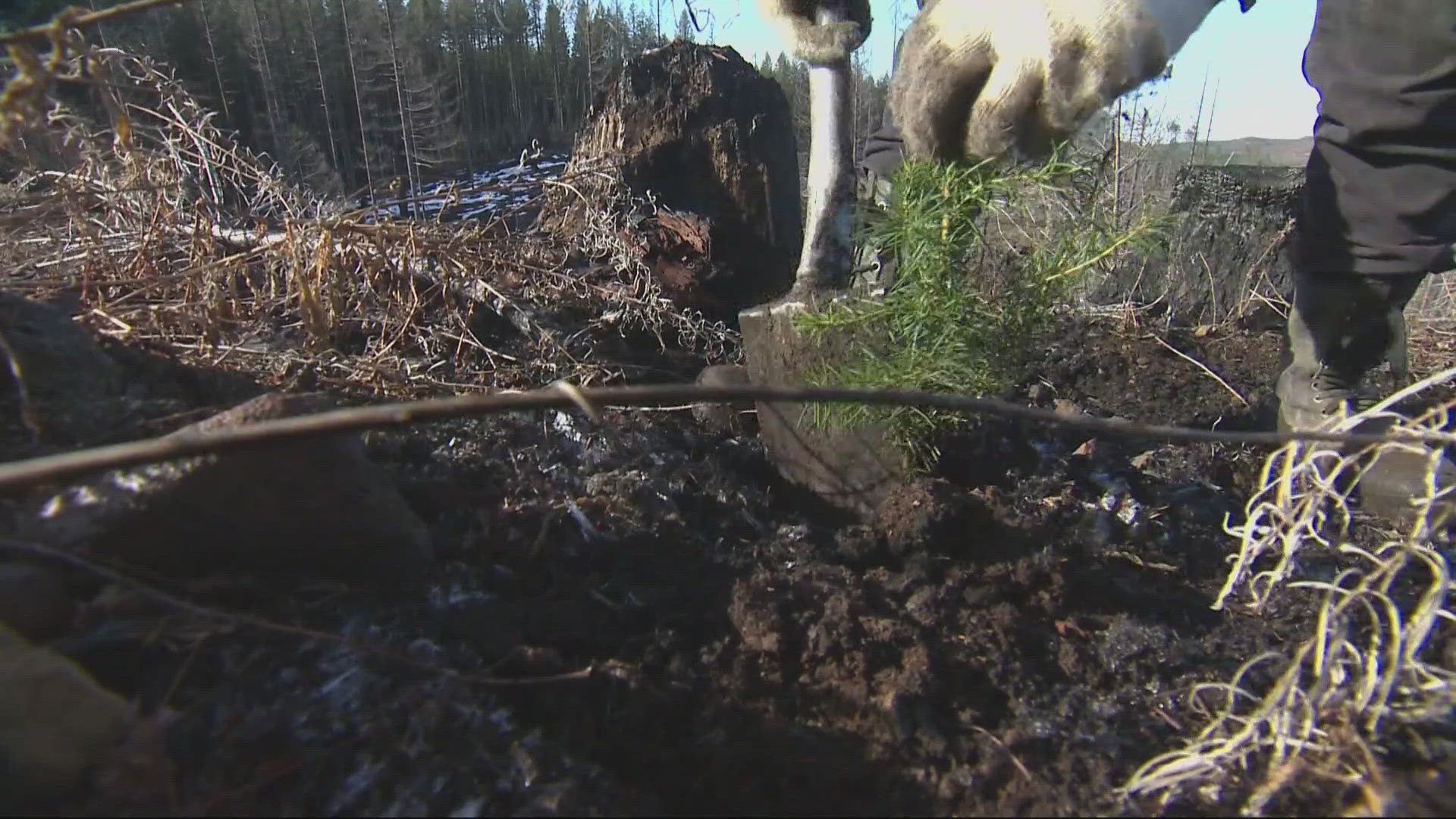SANDY, Ore. — The Camp Creek Fire burning in the Bull Run Watershed east of Portland has grown to about 1,600 acres and is 0% contained as of late Monday morning, according to fire officials.
The fire was sparked by a lightning strike Thursday evening during a spate of thunderstorms in western Oregon. It had grown to just over 1,200 acres on Sunday. Officials said Monday that relatively favorable weather conditions the day before had kept the fire from spreading much beyond its previous footprint.
The fire is burning in an area about 1.3 miles south of Bull Run Reservoir #1, one of two reservoirs that collect water from the 102-square-mile Bull Run Watershed and serve as Portland's primary source of water. The Portland Water Bureau has put up a webpage to provide updates on the situation, and it said the city's drinking water remains safe as of Sunday afternoon.
The fire is about 2.4 miles from the Headworks treatment facility at Bull Run Reservoir #2 and is not threatening the water bureau's infrastructure, according to the website, which noted that the reservoirs themselves serve as a "natural buffer" between the bureau's facilities and the active fire zone.
Firefighters have assessed the Headworks facility and other water bureau structures in the area and found them to be "highly defensible," according to the website, and they will be prioritized as needed. Staff are still present at the facilities but will evacuate if necessary, the water bureau said. Short-term weather forecasts suggest winds will push the fire away from Headworks, the bureau added in a news release Sunday afternoon.
Fire-retardant chemicals were used on Friday and could be used again, the bureau said, but firefighters will not use them inside "defined exclusion zones" that drain into the reservoirs. The use of fire retardants on drinking water quality would be "negligible," according to the website, because the solutions are 85% water to begin with and would be heavily diluted by the billions of gallons in the reservoirs.
However, the bureau added that the best way to assure drinking water quality is to keep the Bull Run Watershed forested, and the fire itself could cause long-term impacts that won't be able to be fully assessed until the fall rainy season.
The fire grew mainly to the south and west on Saturday due to warm and dry weather conditions, according to an update from the U.S. Forest Service. Those conditions will persist Sunday and in the coming days, the agency said, likely leading to more fire growth and smoke impacts. Firefighters are dropping water from helicopters and planes to try to contain it and are using Forest Roads 12 and 14 to the north and south of the fire area as firebreak lines.
The 2017 Eagle Creek Fire pushed into a corner of the Bull Run Watershed, according to the Portland Water Bureau, but fire officials said Sunday that the bulk of the watershed area has not experienced a major wildfire in centuries, meaning the area has a lot of old-growth timber and kindling material built up, making the fire more complex.
"This landscape's not accustomed to fire behavior. The last significant, what they call a 'stand replacement fire,' we're told happened in, I think, about 1493," Operations Section Chief Matt Call said in a video posted to social media. "So, 600 years ago is the last significant fire. So you can imagine, large trees and a lot of accumulated dead and down — we call that 'duffy' layer, a lot of organic material — which provides a lot of fuel for the fire to burn."
There are no fire-related closures or evacuations as of Sunday afternoon, the agency said, but people in the area should stay prepared for both. Command of the fire has switched to the Great Basin Incident Management Team 1, which will be able to bring additional resources to bear, and the agencies involved have set up a dedicated Facebook page to provide updates about the fire.
Officials held an in-person community meeting Sunday evening at Sandy High School, and plan to hold another Monday evening at the Mount Hood Lions Club in Welches.
Smoke from the Camp Creek Fire and other wildfires in the region is impacting air quality in the surrounding area, and the National Weather Service issued an Air Quality Alert Sunday morning that covers significant parts of the Columbia River Gorge, Hood River Valley and areas around Mount Hood such as Government Camp. Air quality will reach unhealthy levels at times through Tuesday afternoon, the agency said.



